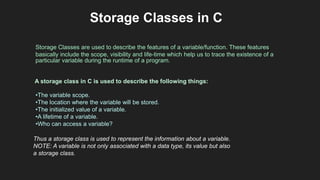
Storage classes
- 1. Storage Classes in C Storage Classes are used to describe the features of a variable/function. These features basically include the scope, visibility and life-time which help us to trace the existence of a particular variable during the runtime of a program. A storage class in C is used to describe the following things: •The variable scope. •The location where the variable will be stored. •The initialized value of a variable. •A lifetime of a variable. •Who can access a variable? Thus a storage class is used to represent the information about a variable. NOTE: A variable is not only associated with a data type, its value but also a storage class.
- 2. C language uses 4 storage classes, namely: Storage class Purpose auto It is a default storage class. extern It is a global variable. static It is a local variable which is capable of returning a value even when control is transferred to the function call. register It is a variable which is stored inside a Register.
- 3. AUTO EXTERN STATIC REGISTER This is the default storage class for all the variables declared inside a function or a block. Hence, the keyword auto is rarely used while writing programs in C language. Auto variables can be only accessed within the block/function they have been declared and not outside them (which defines their scope). Of course, these can be accessed within nested blocks within the parent block/function in which the auto variable was declared. However, they can be accessed outside their scope as well using the concept of pointers given here by pointing to the very exact memory location where the variables resides. They are assigned a garbage value by default whenever they are declared.
- 4. AUTO EXTERN STATIC REGISTER Extern storage class simply tells us that the variable is defined elsewhere and not within the same block where it is used. Basically, the value is assigned to it in a different block and this can be overwritten/changed in a different block as well. So an extern variable is nothing but a global variable initialized with a legal value where it is declared in order to be used elsewhere. It can be accessed within any function/block. Also, a normal global variable can be made extern as well by placing the ‘extern’ keyword before its declaration/definition in any function/block. This basically signifies that we are not initializing a new variable but instead we are using/accessing the global variable only.
- 5. AUTO EXTERN STATIC REGISTER This storage class is used to declare static variables which are popularly used while writing programs in C language. Static variables have a property of preserving their value even after they are out of their scope! Hence, static variables preserve the value of their last use in their scope. So we can say that they are initialized only once and exist till the termination of the program. Thus, no new memory is allocated because they are not re-declared. Their scope is local to the function to which they were defined. Global static variables can be accessed anywhere in the program. By default, they are assigned the value 0 by the compiler.
- 6. EXTERN STATIC REGISTER AUTO This storage class declares register variables which have the same functionality as that of the auto variables. The only difference is that the compiler tries to store these variables in the register of the microprocessor if a free register is available. This makes the use of register variables to be much faster than that of the variables stored in the memory during the runtime of the program. If a free register is not available, these are then stored in the memory only. Usually few variables which are to be accessed very frequently in a program are declared with the register keyword which improves the running time of the program. An important and interesting point to be noted here is that we cannot obtain the address of a register variable using pointers.
- 8. AUTO EXTERN STATIC REGISTER 1.#include <stdio.h> 2.int main() 3.{ 4.int a; //auto 5.char b; 6.float c; 7.printf("%d %c %f",a,b,c); // printing initial default value of automatic variables a, b, and c. 8.return 0; 9.} Output: garbage garbage garbage
- 9. AUTO EXTERN STATIC REGISTER 1.#include <stdio.h> 2.int a; 3.int main() 4.{ 5.extern int a; // variable a is defined globally, the memory will not be allocated to a 6.printf("%d",a); 7.} Output: 0
- 10. AUTO EXTERN STATIC REGISTER 1.#include<stdio.h> 2.void sum() 3.{ 4.static int a = 10; 5.static int b = 24; 6.printf("%d %d n",a,b); 7.a++; 8.b++; 9.} 10.void main() 11.{ 12.int i; 13.for(i = 0; i< 3; i++) 14.{ 15.sum(); // The static variables holds their value between multiple function calls. 16.} 17.} Output: 10 24 11 25 12 26
- 11. AUTO EXTERN STATIC REGISTER 1.#include <stdio.h> 2.int main() 3.{ 4.register int a; // variable a is allocated memory in the CPU register. The initial default value of a is 0. 5.printf("%d",a); 6.} Output: 0
- 12. Created By :- Mr. UTTAM VERMA M.C.A. 1ST SEMESTER M.D.S.U (AJMER)
